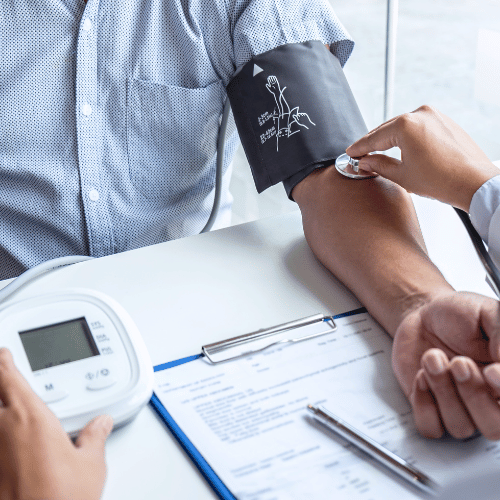
Medical Weight Loss Explained
A lot is said about medical weight loss but we are here to debunk the myths for you.
Cardiology > Blood Pressure Monitoring

Find Out More


Ambulatory Blood Pressure Monitoring (ABPM) is a comprehensive and accurate method for diagnosing and managing high blood pressure (hypertension).
Unlike traditional blood pressure measurements taken at a single point in time, ABPM provides a detailed, around-the-clock view of your blood pressure levels.
If you are experiencing symptoms of high blood pressure or have been advised to monitor your blood pressure more closely, ABPM could be the solution you need.

ABPM records your blood pressure at regular intervals over a 24-hour period, capturing data during both day and night. This helps to identify patterns and fluctuations that might be missed during a standard check-up.
Often, having a blood pressure reading taken can cause significant stress (particularly if you have received abnormal results in the past), leading to a temporary increase in blood pressure at the time of testing, which may result in a misdiagnosis. It is currently thought that roughly 25% of diagnoses made through straightforward in-clinic blood pressure tests are inaccurate.
By monitoring blood pressure throughout daily activities and during sleep, ABPM helps to distinguish between true hypertension and white-coat syndrome (where blood pressure spikes due to anxiety during medical visits). Continuous data collection allows for more precise adjustments to your treatment plan, ensuring better control of your blood pressure and reducing the risk of associated complications.
Regular blood pressure monitoring is important for several reasons:
By staying on top of your blood pressure, you can take proactive steps to maintain cardiovascular health and overall well-being.


Everyone should have their blood pressure tested regularly, but it is especially important for the following groups:
You can expect the following from Ambulatory Blood Pressure Monitoring (ABPM):
Use our online booking engine or book your test by giving us a call.
On the online booking engine select the “appointment type” you need.
You will be seen by one of our friendly doctors or trained clinicians.

Refrain from consuming caffeine, alcohol, and excessive salt in the 24 hours leading up to your appointment, as these can affect blood pressure readings. Inform your healthcare provider about all the medications you are taking. They will advise whether you need to adjust or withhold any medications before the test. Wear a loose, comfortable shirt or blouse that allows easy access to your upper arm. The monitor needs to fit snugly around your arm. The ABPM is usually scheduled for 24 hours, but the duration might vary depending on the protocol used.

Blood pressure monitoring involves placing a cuff on your arm connected to a device that automatically records regular blood pressure readings throughout the day and night. The cuff will inflate automatically at regular intervals. You can go about your normal activities during this non-invasive process; however, avoid strenuous exercise or activities that might disturb the monitor. Keep a diary of your activities, meals, and any symptoms you experience during the monitoring period. This information will help your healthcare provider interpret the results. After the monitoring period, return the device to your healthcare provider for analysis, which will provide a comprehensive overview of your blood pressure patterns.

After the 24-hour period, return to your healthcare provider to have the device removed. Your provider may ask about your experience with the monitor and any issues you encountered. The data collected will be analysed by your healthcare provider to assess your blood pressure patterns over the 24-hour period. You will be scheduled for a follow-up appointment to discuss the results and any additional steps required based on the findings. Resume your normal activities and medications as advised by your healthcare provider.
Incorporated
in 1998
Experienced doctors & a professional team
Registration
not needed
Up-to-date with the latest treatments & testing
Strictly
confidential
Experienced doctors & a professional team
Affordable private
health care
Transparent fee structure with no hidden charges
We work with experienced consultants & healthcare professionals who have received positive feedback from our patients, and with whom we have established long-term relationships.
Latest Episode
Tune in to our podcast to explore the world of healthcare and learn from distinguished special guests. We cover everything from preventative measures to cutting-edge treatments so that you can stay informed and up-to-date on health-related things.

A lot is said about medical weight loss but we are here to debunk the myths for you.

Tourist in London and need a GP? Get fast, private care for illnesses, injuries, or lost medication. No registration needed.

With NHS appointments harder to access, many people are turning to private GPs for faster, more convenient care.
Subscribe for latest updates & news


From same-day private GP and blood test appointments to visa medicals, a sexual and reproductive health clinic, and preventative health screenings, we are here to help.
Contact Us
Accepted Insurance Companies






Please note that Walk-in Clinic is a private medical centre & not an NHS service. Harley Walk-in Clinic Ltd company registration no. 07472804